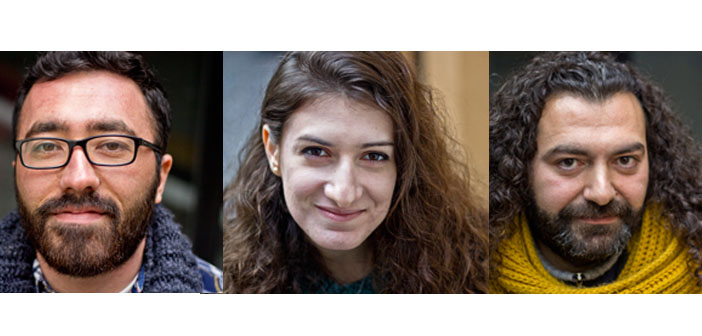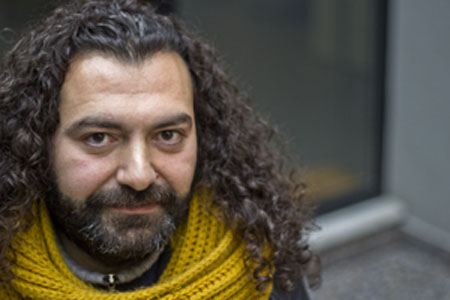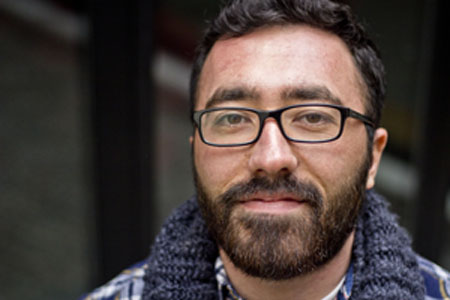Türkiye’yi üreterek tanıyan ve tanıtan Ermenistanlı bursiyerler


İstanbul’da farklı alanlarda çalışmaya başlayan Ohanyan, Yeğiazaryan ve Pivazyan heyecan verici projelerini anlatırken, Türkiye-Ermenistan arasında bir köprünün daha atıldığını görüyoruz. “Kül olmuş yuvamdan yanan evinize geldim” diyor Can Yayınları’nda çalışmaya başlayan Armen Ohanyan. Yaşadığı Kurtuluş’un duvarlarında Ermenice “Evimiz nerede?” yazısının cevabını ‘İçimizdeki Ermeni’ kitabının satırlarında bulan Armen Hayastantsi, Türkiyelilere “hoş bulduk” diyor.
‘Meydan okuma’
Kitaplarını Armen Hayastantsi olarak imzalayan Armen Ohanyan, kullandığı mahlasın milliyetçilikle yakından uzaktan bir ilişkisi olmadığını anlatıyor: “Yazarım. Yerevan’da doğdum. Edebi çevrelerde mahlasım olan Armen Hayastantsi (Ermenice Hayastantsi Ermenistanlı demek) olarak tanınıyorum. İnsanlara ilk bakışta biraz milliyetçi bir isim gibi gelebilir ama beni tanıyan, edebiyatımı bilen insanlar, milliyetçiliğe çok mesafeli olduğumu bilirler. Bu mahlasla bir nevi meydan okuyorum diyebiliriz, biraz da mizah barındırıyor. ‘Hayastantsi’ ulusal kimliği göstermiyor. Bu, sadece Ermenistan’da yaşadığımı, Ermenistan vatandaşı olduğumun göstergesidir. Yoksa Ermenistan vatandaşı olan Ezidi de olabilirim.
İki kitabım çıktı şimdiye kadar. 30 yaşından sonra yazmaya başladım, belki sadece iki kitabımın olmasının nedeni de bu. Biri kısa öykülerden oluşuyor. İkincisi ise ‘Ana vatan’ üçlemesinin ilk romanı olarak basıldı. Romanın adı ‘Ana vatan: bayrak’.”

'Yazma cesareti’
Armen Hayastantsi, sınır köyünde öğretmenlik yaptığı yılları şöyle anlatıyor: “Yazmaya başlamadan önce aklına gelecek her işi yaptım. İran’la Ermenistan sınırında, Meğri’deki Karjevan köyünde yedi yıl öğretmenlik yaptım. O yılları hep gülümseyerek hatırlıyorum. Çok güzel bir dönemdi. Farklı derslere girdim. Felsefe bölümünden mezun olduktan sonra askerlik yerine sınır bölgesinde çalışmaya karar verdim. O zamanlar böyle bir seçenek halen vardı. Birilerinin kalkıp yatmamı, koşup durmamı emredeceği fikri ile asla barışamadım. Bu benim için ölüm olurdu. Böylece bir seneliğine köye çalışmaya gittim ama yedi yıl sürdü. Orada vaktimi çok verimli kullandım. Zaten insanlarla sürekli iletişim haldesin, çocuklarla çalışıyorsun, onlardan hep bir şeyler öğreniyorsun. Bunun dışında hayatım boyunca okuduğum kitapların %80’ini orada okudum diyebiliriz. Köy kütüphanesini yuttum, sonra yan şehirlerdeki kütüphanelere geçtim. Ve bu süreçte yaptığım okumalardan dolayı da nihayet yazmaya cesaret edebildim. Söylenecek çok şey vardı elbette.”
‘Evdeymişim gibi’
Farklılıkların yanı sıra Ermenistan ve Türkiye’nin çok benzediğini söyleyen Armen Hayastantsi, komşu ülkeler arasındaki ilişkilerden haberdar olduğunu dile getiriyor ve İstanbul’da yabancılık çekmediğini vurguluyor: “Vatandaş olarak da aktiftim. Helsinki Yurttaşlar Derneği’nin (HYD) eski üyelerinden biriyim. Bu tecrübe de hayatımı çok etkiledi. HYD gençlik kolu olarak Ermenistan-Türkiye arasında ilk yaz okulunu başlatmıştık. ‘Yavaş-Gamats’ adlı bu projeye sonra HYD Vanadzor ofisi devam etti. Bunun kuruluş aşamasında yer aldığım için çok mutluyum. Ermenistan-Türkiye normalleşmesi fikrinden birdenbire etkilenerek buraya gelmedim. Yıllar boyunca bu fikir, anlayış içimde büyüyerek olgunlaştı. Geleceğimiz için barışı inşa etmemiz lazım, ilişkilerin normalleşmesi lazım. Normalleşme derken sadece siyasi normalleşmeden, sınırların açılmasından bahsetmiyorum, gerçekten de derin, barışçıl komşu ilişkilerini kastediyorum. Ermenistan ve Türkiye farklı ülkeler olmasına rağmen aslında birbirine çok benziyorlar. Belki bu yüzden burada kendimi yabancı hissetmiyorum, hatta Türkçe bilmediğim halde bazı konuşmaların konusunu tahmin edebiliyorum. Olaylar, gündelik hayat akışının mantığı çok benziyor. Evdeymişim gibi hissediyorum.”
Ölüm ve yazı
Armen Hayastantsi, “Beni ölüm ve yazı buraya getirdi. Hrant Dink’in ölümü ile barışmak imkânsız, zira Hrant Dink bizden biri. Yazı da hepinizin ortak çabalarıyla ortaya çıkan bu kitap” diyor. Armen Hayastantsi’nin bahsettiği yazı-kitap, Can Yayınları’ndan çıkan ‘İçimizdeki Ermeni’: “ ‘İçimizdeki Ermeni’ (1915-2015) çok güzel bir kitap. Günümüz Türkiyesi’nin bilinen yazarları özel olarak kaleme aldıkları yazılarıyla bu seçkide yer alıyor. Onlardan her biri Ermenileri yazdı, samimiyetle yazdı. Bence edebiyat samimiyet alanıdır, sahte olan her şey edebiyatta hemen göze batar. Bahsettiğim kitabın Ermenistan’daki okurlara da kazandırılması gerektiğini düşünerek bu projeye başladım. Fonla çevrilmiş ve raflarda kalacak bir kitap olarak değil, okurlara gerçekten ulaşacak bir kitap olarak sunulması gerekiyor. Bir kitap, insanların pek inanmadığı, insanların kalplerine dokunmayan yüzlerce siyasi konuşmadan daha etkileyici olabilir. Bu konuda yazarlara çok büyük bir görev düşüyor. Kültürlerimizde yazarlara entelektüel bireyler olarak yaklaşılıyor. O yüzden halk, yazarlardan değişime dair söz, tepki, fikir bekler. Bu beklentinin Ermenistan’da olduğunu kesinlikle biliyorum.”
‘İki ülke’
Can Yayınları ile çalıştıkları projenin Ermenistan-Türkiye arasında bir köprü oluşturacağını söyleyen yazar, çalışmanın ayrıntılarını büyük bir heyecanla anlatıyor: “Bu, sadece bir çeviri projesi değil, yıllar sürecek bir proje. Ermenistan ve Türkiye edebiyatları arasında çok sağlam bir köprü yaratmasını umuyorum. Türkiye’den 36 yazar var, Ermenistan’dan da 36 yazar bulmam lazım. Kitapta yer alan 36 yazarla edebi üslubu ile benzeyen yazarlar bulmamız lazım. Bunlardan biri benim, geri kalan yazarları dâhil etmem gerekecek. Seçkideki bu yazıları Ermenistanlı yazarlar doğrudan çevirmeyecek ama yapılan Ermenice çevirileri edebi dil açısından ele alarak son şeklini verecek Ermeni edebiyatına kazandıracak. Umarım buradaki yazarların birçoğu Ermenistan’a gelip oradaki Ermenilerle tanışır. Bu tecrübe Ermenistan-Türkiye kültür ilişkilerini ve genel ilişkileri etkileyecek, iki ülke arasında köprü oluşturacak.”
Dönüm noktası
Ermenistanlı yazar, kendisini Türkiye’ye getiren ilk neden olarak bahsettiği Hrant Dink’le ilgili şunları söylüyor: “Hrant Dink’in öldürülmesini Ermenistan-Türkiye ilişkilerinde dönüm noktası olarak görüyorum. Ermenistan halkı kendisine hep ‘düşman’ ülkesi olarak gösterilen ülkeden gelen barışçıl, umut verici manzara ile karşılaştı. Binlerce kişinin toplandığını gördüler, o binlerin sadece bir kısmı Ermeni idi. Ermenistan halkı o binlerin ellerinde ‘Hepimiz Hrant’ız’ posterlerini gördü ve yıllar boyunca kendisine bir yalan sunulduğunun farkına vardı. Yıllar boyunca Türkiye’de Ermeni kalmadığını, çok küçük bir Ermeni toplumun yaşadığını anlatmışlardı. Hep Ermenilere karşı olan nefretten bahsedilirdi. Bu noktada Hrant Dink’in ölümünün devrim yaptığını söylemek yanlış olmaz. Günümüzde de Ermenistan’da Türkiye’ye ilgi var, onlarla daha yakın ilişkiler kurmak istiyorlar. Yakında belki sınırlar da açılır. Halklarımızın buna hazır olması lazım.”

'Düşman’la birlikte
Artsrun Pivazyan ise yaklaşık iki aydır Boğaziçi Üniversitesi’nin Barış Eğitimi Uygulama ve Araştırma Merkezi’nde çalışma yürütüyor. Çatışmalı ülkeler üzerine çalışan Artsrun Pivazyan’ın konuya ilgisinin askerlik döneminde başladığını vurgulamak lazım. Pivazyan, hayat hikâyesini ve barış, çatışma gibi konulara ilgisini şu şekilde anlatıyor: “Yerevan’da doğdum, büyüdüm. Avrupa Bölgesel Eğitim Akademisi’nin Uluslararası İlişkiler bölümünden mezun oldum. Askerliğimi Karabağ’da, sınır hattında yaptım. Askerlikten sonra Avrupa Gönüllü hizmeti ile Romanya’da, Bükreş’te çalıştım. Dokuz ay boyunca gençlerle, çocuklarla kültürler arası barış, çatışma çözümü üzerine çalışmalar yürüttüm. Sonra İtalya’da ‘Rondine’ merkezinde staj yaptım. Çatışmalı bölgelerden gelen gençlerle birlikte yaşayarak barışı anlamaya çalıştık. Benim staj dönemimde Azerbaycan, Ermenistan, İsrail, Filistin, Sırbistan, Kosova, ABD, Sudan, Rusya, Çeçenya, Gürcistan gibi ülkelerden gençlerle bir arada yaşadık, zira amaç ‘düşman’la birlikte yaşamaktı. Stajdan sonra Roma Üçüncü Üniversitesi’nde Barış Çalışmaları, Uluslararası İşbirliği ve AB politikası adlı yüksek lisans programında eğitim almaya başladım.”
Sınırın öte yanı
Artsrun Pivazyan, en gergin dönemlerde bile Azerbaycanlı arkadaşlarıyla iyi anlaştıklarını dile getiriyor ve Karabağ’daki askerlik deneyiminden İtalya’ya ve Boğaziçi Üniversitesi’ne uzanan hikâyesinden bahsediyor: “Çatışmalı ülkelere ilgim askerlik döneminden geliyor. Askerliğimi Karabağ’da yaptım. Orada Ermenistan tarafında olan bitenleri çok açık görebiliyordum ve sınırın öbür tarafında, yani ‘düşman’ dedikleri tarafta neler olduğunu merak etmeye başladım. Orası ulaşılmazdı. Askerlik sırasında elbette kayıplar da verdik. Orada bizimle ilgili de birçok şeyi sorgulamaya başladım. Azerbaycan’la Ermenistan arasında yapılan bir diyalog projesine katılma şansı yakaladım ve Azerbaycan’dan gelenlerle konuştum. O günlerde sınırda durum çok gergin olmasına rağmen anlaşabiliyorduk. Her şartta anlayışa varabileceğimizin göstergesiydi o. İtalya’da bahsettiğim staj sırasında Azerbaycan’dan gelenlerle yaşıyordum. Geçtiğimiz Nisan ayında yükselen çatışmalarda bile orada biz barışı konuşuyorduk ve ortak yaşamaya çalışıyorduk. Bunun çok önemli bir tecrübe olduğunu düşünüyorum. ‘Barış süreçlerinde belleğin rolü’ adlı bir araştırma yürütüyorum. Örnek çalışmaları inceliyordum. Hrant Dink Vakfı’nın burs programı Türkiye’nin en iyi üniversitelerinden birinde, Boğaziçi’nde bulunup bu konu ile ilgili daha fazla bilgi edinmemi sağladı. Boğaziçi Üniversitesi’nin Barış Eğitimi Uygulama ve Araştırma Merkezi’nde bahsettiğim araştırma üzerine çalışıyorum. Araştırmadan sonra dersler düzenlemeyi planlıyoruz.”

Gazeteci olarak
Programın bir diğer bursiyeri gazeteci Maria Yeğiazaryan da, gazetecilerin mutlaka seyahat etmesi ve kendi ülkesine dışarıdan bakabilmesi gerektiğine inanıyor: “Dört yıl Yerevan merkezli CivilNet’te gazeteci olarak çalıştım. Bir sene boyunca Fransa’nın Marsilya şehrinde Avrupa Gönüllü Hizmeti projesi kapsamında yine medya sektöründe gönüllü olarak çalıştım. Hem alanda deneyim kazanmak hem de Ermenistan’a dışarıdan bakmak istediğim için Marsilya’ya gittim. Biraz Fransızca bildiğim için de zor olmadı. Marsilya’da çeşitli sosyal sorumluluk projeleri yaptık: engelli çocuklarla, hapisteki çocuklarla farklı projeler yürüttük. Amaç sadece çocuklar hakkında değil aynı zamanda çocuklarla beraber filmler çekmekti. Çocukların çekim süreçlerine dâhil olması ve bütün tekniği öğrenmesi çok önemliydi.”
‘İlk gelişim değil’
Türkçe öğrenerek Türkiye’deki Ermeni toplumu daha iyi anlamayı ve onları Ermenistan halkına tanıtmayı hedefleyen Yeğiazaryan, ev sahibi kuruluşlarda çok iyi karşılandığını aktarıyor: “Bu, İstanbul’a ilk gelişim değil. CivilNet’te çalıştığım yıllarda İstanbul’daki Ermeni cemaati hakkında birçok program hazırladım. Oradan da İstanbul’a, buradaki Ermeni cemaatine, Türkiye-Ermenistan ilişkilerine olan ilgim daha da arttı. Burs programının tekrar açıldığını ve Türkiye’deki ev sahibi kuruluşlar arasında film yapımı üzerine çalışan kurumların da bulunduğunu görünce başvurup şansımı denemeye karar verdim. Şu an Türkçe öğreniyorum. Dili öğrendikten sonra buradaki Ermeni toplumunu daha iyi anlayabileceğime inanıyorum. Hrant Dink Vakfı’nın Burs programı kapsamında yaptığım başvuru ‘Ret Film’ ve ‘Liman Film’ tarafından kabul edildi. Burada hem festivallerle ilgili araştırma ve hazırlık yapıyorum, hem de çekilmiş filmlerin kurgu sürecini takip edebiliyorum. Türkçe öğrenmek istiyordum. İyi bir hocamız var ve şimdiye kadar çok memnunum. Bana ev sahipliği yapan iki kurumda da çok iyi karşılandım, mümkün olan bütün projelere beni dâhil etmeye çalışıyorlar.”
Diyalog imkânı
Komşu ülkeler arasında diyalog için insanları harekete geçmeye çağıran Maria, harekete geçmenin önemini vurguluyor: “Ermenistan-Türkiye normalleşme sürecinde diyalog çok önemli. Diyalog ise insanların iletişimiyle, birbirinin kültürünü tanımasıyla mümkün olabilir. Birkaç yıl önce Ermenistan’da Türkiye’deki Ermeni toplumu hakkında çok kısıtlı bilgi vardı. Günümüzde de belki durum çok farklı değil ama en azından buna yönelik adımlar atılmaya başlandı. Oturduğumuz yerden şikâyet edersek olmaz, her birimiz bir adım atmalıyız. Bu program bahsettiğim diyaloğu mümkün kılıyor, güçlendiriyor. Türkiye’nin mevcut siyasi durumunda bile Ermenistan’dan çok sayıda kişinin başvurması ve katılma isteği çok iyi.”
Türkiye-Ermenistan Burs Programı
Hrant Dink Vakfı, Türkiye-Ermenistan Burs Programı’nı, 2014’te, Avrupa Birliği tarafından finanse edilen Ermenistan-Türkiye Normalleşme Süreci Destek Programı kapsamında, komşu ülkeden profesyonellerin sınır ötesi işbirliği ağları kurmalarını teşvik etmek amacıyla oluşturdu.
Burs Programı 2014-2015 döneminde, 91 başvuru arasından Ermenistan’dan 12, Türkiye’den 6 profesyonelin İstanbul, Yerevan ve Gümrü’deki faaliyetlerini destekledi.
Burs Programı’nın 2016-2017 döneminde ise, 11 profesyonel programa katılmaya hak kazandı. Bursiyerlerin birçoğu komşu ülkeye gelerek programlarına başlamış bulunuyor.
Türkiye’den 43, Ermenistan’dan 31 farklı ev sahibi kuruluş, komşu ülkeden gelecek profesyonelleri ağırlamaya hazır. Ev sahibi kuruluşların önerdiği program teklifleri dışında, kendi proje fikirlerini komşu ülkede hayata geçirmek isteyen adaylar da başvurularını sunabiliyor. Ev sahibi kuruluşlar arasında çok önemli üniversiteler, medya kuruluşları, STK’lar ve farklı faaliyetler gösteren kuruluşlar bulunuyor.
Ermenistan’dan ve Türkiye’den üniversite öğrencileri, akademisyen ve bağımsız araştırmacılar, sivil toplum çalışanları, gazeteciler, muhabir ve foto-muhabirler, fotoğrafçılar, sanatçılar, tasarımcılar, mimarlar, aşçılar, yazarlar, çevirmenler, hukuk ve halkla ilişkiler uzmanları ve kendi proje fikirlerini hayata geçirmek isteyen herkes programa başvurabilir.
Türkiye ve Ermenistan vatandaşları ile Türkiye ve Ermenistan’da ikamet eden adaylar burs programına başvurabilirler.



